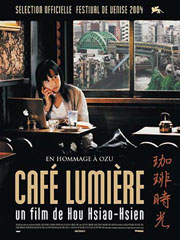
I know I should have had updated this sooner during the school holiday. But hey I got life you know. On my birthday this year Mat took me (of course it's originally my idea) to the Siam Ocean World to see weird fish and a fake polar bear. It's such a pleasant experience to leave books once in a while and do something else. Well, books might be the world but the world does not only comprise books. Bookworms beware! Saying that, I'm hooked on Garcia Marquez's Erendira story at the moment. Such a contradictory man I am.
Right, today I'm going to talk about the Japanese film Cafe Lumiere, which I saw long time ago but the feeling still somewhat lingers. It's nice to watch a 'silent' film once in a while, especially if you happen to live in one of the maddest cities in the world, littered with noise everywhere. Tops supermarkets for instance install this terrible advert thing -- if someone walks past this machine, it'll be activated to switch on and emit noise selling all sort of products from whitening face masks to cockroach baits. On top of that, they even play Tops radio in the background (sometimes so loud that I couldn't hear myself think!). I reckon people at Tops don't want customers to make a good judgement on what to buy and what not, but to be lured by their price gimmicks and display tactics.
Anyway, let's talk about the film. When I say it's a 'silent' film, I don't mean that the actors don't talk or become some sort of mute people. They do talk but they choose not to (maybe they've been living in Bangkok before moving back to Japan). It's 'almost a love story' between Yoko and Hajime, 'almost a love story' because you only 'feel' that the two are in love but there's no physical evidence of whatever kind in the film that tells you straightaway that they're so in love. They don't kiss; they don't hug, so don't even bother imagining that they'll have sex on the train like some Japanese porns. They just talk and sometimes they remain quiet -- just like that, side by side, in a second-hand bookshop run by Hajime, who happens to be handsome -- but somehow you can feel that there's kind of warmth and understanding emanating from their co-presence.
There's also another kind of quiet -- that between Yoko and her parents, especially her reticent Dad. Yoko is pregnant with someone else and her Dad does nothing but remain silent throughout. You can just tell that there's some sort of reproachful tone in his silence (pardon my use of paradox here).
The film ends abruptly, without letting people know that the two will live happily ever after. When I watched it, I was quite surprised at such a sudden end and thought that there's something wrong with the DVD. But then I bought it from a proper shop in Central World, not from a Silom stall, so it should be all right. It's just my mindset that's the problem. So I started to readjust my frame, realising that maybe the end is meant to be like that -- quick, abrupt, but powerful. Powerful in the sense that maybe life is like that: no one will know how people's lives will end and it can be quite precocious to presume. Maybe when two lives converge, it's like two trains passing each other. Just like that. A fond memory. Something that doesn't last but somehow lingers. No wonder why Hajime likes to record 'the sound of the trains': to take this metaphorically, perhaps Hajime can be compared to a film producer who tries to capture the rhythm of contemporary urban lifestyle in the changing Tokyo landscape. Oh such a metafictional subtext. Traditional narrative forms may no longer be appropriate -- no fairy-tale ending, no magical stardust turning an ugly pauper into a handsome prince. But it's good that it still keeps one traditional element intact -- love. Even though I didn't recall hearing the word uttered in the film, I got the feeling that the film wants us to realise that it's not easy living in a big city like Tokyo, but if there's someone there with you life will at least be easier.
Gosh, it's the first time in this weblog that I don't express any anger or annoyance at the end. How rare!

1 comment:
I totally agree about Tops, the place is unbearable. Cafe Lumiere is such a 'silent' film because it's a tribute to Ozu.
Post a Comment